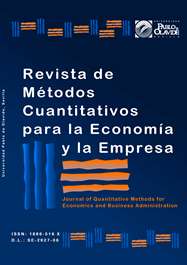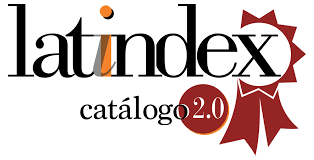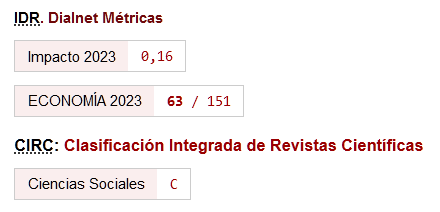Propiedades psicométricas de la Escala de Autoeficacia Empresarial en universitarios de México
DOI:
https://doi.org/10.46661/revmetodoscuanteconempresa.6305Palabras clave:
autoeficacia, emprendimiento, validez, universitarios, pobrezaResumen
La investigación se centró en aportar evidencias de validez de constructo, convergente y de criterio, así como de fiabilidad para la Escala de autoeficacia empresarial (ESE) y analizar la equivalencia factorial por grupos participantes: sexo, rangos de edad, estadios de desarrollo, semestre y universidades. Participaron 1,525 estudiantes de dos universidades públicas mexicanas. Se aplicó la versión adaptada al español usando el procedimiento de traducción inversa, así como la escala de emprendimiento social (SEAS). La adaptación del ESE al español reproduce los seis factores propuestos por los autores originales en un modelo de segundo orden que muestra un buen ajuste (χ² = 2,367, p < 0.05), gl = 229, RMSEA = .08, SRMR = ,04, CFI = .95, TLI = .94, AIC = 81,521). Se encontró que la autoeficacia empresarial predice el 23.3% de la intención de emprendimiento y presenta una correlación moderada con la autoeficacia del SEAS (r = 0.48). En general se encontró invarianza configuracional y métrica en cada uno de los grupos analizados (ΔCFI > -.01). El valor del coeficiente de omega McDonald fue de .94. La Escala de Autoeficacia Empresarial aplicada a los universitarios en contextos de pobreza en México es confiable, con evidencias de validez e invariante para los distintos grupos analizados.
Descargas
Citas
Abaho, E., Olomi, D.R., & Urassa, G.C. (2015). Students’ entrepreneurial self-efficacy: does the teaching method matter? Education and Training, 57(8-9), 908-923. https://doi:10.1108/ET-02-2014-0008
Ahlin, B., Drnovšek, M., & Hisrich, R.D. (2014). Entrepreneurs' creativity and firm innovation: The moderating role of entrepreneurial self-efficacy. Small Business Economics, 43(1), 101-117. https://doi.org/10.1007/s11187-013-9531-7
Álvarez, R.D., De Noble, A.F., & Jung, D. (2015). Educational Curricula and Self-Efficacy: Entrepreneurial Orientation and New Venture Intentions among University Students in Mexico. International Research in the Business Disciplines, 379-403: Emerald (MCB UP). https://www.researchgate.net/publication/241701372_Educational_Curricula_and_Self-Efficacy_Entrepreneurial_Orientation_and_New_Venture_Intentions_among_University_Students_in_Mexico
Bandura, A. (1977). Self-efficacy: Toward a unifying theory of behavioral change. Psychological Review, 84(2), 191-215. https://doi.org/10.1037/0033-295x.84.2.191
Bandura, A. (1986). Social foundations of thought and action: A social cognitive theory. Prentice-Hall Englewood Cliffs, NJ.
Bandura, A., & Walters, R. H. (1977). Social learning theory (Vol. 1). Prentice-Hall Englewood Cliffs, NJ.
Bernal-Guerrero, A., & Cárdenas-Gutiérrez, A. R. (2017). Evaluación del potencial emprendedor en escolares. Una investigación longitudinal. Educación XX1, 20(2), 73-94. https://doi.org/10.5944/educxx1.19032
Block, J. (2008). The Q-sort in character appraisal: Encoding subjective impressions of persons quantitatively. American Psychological Association. https://doi.org/10.1037/11748-000
Bratkovič, T., Antončič, B., & de Noble, A.F. (2012). Relationships between networking, entrepreneurial self-efficacy and firm growth: The case of Slovenian companies. Ekonomska Istrazivanja, 25(1), 61-71. https://doi.org/10.1080/1331677X.2012.11517494
Breslin, D. (2017). Learning to Evolve: Increasing Entrepreneurial Self-Efficacy and Putting the Market First. Entrepreneurship Education, 7, 17-45. https://doi.org/10.1108/S2040-724620170000007007
Campo-Arias, A., & Oviedo, H. C. (2008). Propiedades Psicométricas de una Escala: la Consistencia Interna. Revista de Salud Pública, 10(5), 831-839. https://www.redalyc.org/articulo.oa?id=42210515
Cheung, G.W., & Rensvold, R.B. (2002. Evaluating goodness-of-fit indexes for testing measurement invariance. Structural Equation Modeling: A Multidisciplinary Journal, 9(2), 233-255. https://doi.org/10.1207/s15328007sem0902_5
Consejo Nacional de Evaluación de Política de Desarrollo Social (2018), Medición de la pobreza, Estados Unidos Mexicanos, 2008-2018, Base de Datos. https://www.coneval.org.mx/Medicion/MP/Paginas/AE_pobreza_2018.aspx
Consejo Nacional de Evaluación de Política de Desarrollo Social (2015). Medición de la pobreza municipal, Estados Unidos Mexicanos, 2010-2015 (Base de Datos). [Municipal poverty measurement, United Mexican States, 2010-2015 (Database)]. https://www.coneval.org.mx/Medicion/Paginas/AE_pobreza_municipal.aspx.
Consejo Nacional de Evaluación de Política de Desarrollo Social (2016). Medición de la pobreza, Estados Unidos Mexicanos, 2010-2015 (Base de Datos). [Poverty measurement, United Mexican States, 2008-2016 (Database)]. https://www.coneval.org.mx/Medicion/MP/Paginas/AE_pobreza_2018.aspx
Cumberland, D.M., Meek, W.R., & Germain, R. (2015). Entrepreneurial self-efficacy and firm performance in challenging environments: Evidence from the franchise context. Journal of Developmental Entrepreneurship, 20(1), 1-19. https://doi.org/10.1142/S1084946715500041
De Noble, A. F., Jung, D., & Ehrlich, S.B. (1999). Entrepreneurial Self-Efficacy: The Development of a Measure and Its Relationship to Entrepreneurial Action. In Frontiers for Entrepreneurship Research (pp. 73-78). Waltham, MA: P&R Publication Inc.
Díaz, E.R. (2021). Evidence of Validity and Reliability of the Entrepreneurial Self-Efficacy Scale. Latin American Business Review, 23(2) 1-14. https://doi.org/10.1080/10978526.2021.1911663
Dimitrov, D.M. (2010). Testing for factorial invariance in the context of construct validation. Measurement and Evaluation in Counseling and Development, 43(2), 121-149. https://doi.org/10.1177/0748175610373459
Eremenco, S.L., Cella, D., & Arnold, B.J. (2005). A comprehensive method for the translation and cross-cultural validation of health status questionnaires. Evaluation & the Health Professions, 28(2), 212-232. https://doi.org/10.1177/0163278705275342
Gámez-Gutiérrez, J., & Garzón-Baquero, J. E. (2017). New cross-proposal entrepreneurship and innovation in educational programs in third level (tertiary) education. Contaduría y Administración, 62(1), 239-261. https://doi.org/10.1016/j.cya.2016.10.005
Hair, J.F., Anderson, R.E., Tatham, R.L., & Black, W.C. (1999). Análisis multivariante. Prentice Hall.
Hallak, R., Assaker, G., & O'Connor, P. (2014). Are family and nonfamily tourism businesses different? An examination of the entrepreneurial self-efficacy-entrepreneurial performance relationship. Journal of Hospitality & Tourism Research, 38(3), 388-413. https://doi.org/10.1177/1096348012461545
Hockerts, K. (2015). The Social Entrepreneurial Antecedents Scale (SEAS): a validation study. Social Enterprise Journal, 11(3), 260-280. https://doi.org/10.1108/sej-05-2014-0026
Hu, L.T., & Bentler, P.M. (1999). Cutoff criteria for fit indexes in covariance structure analysis: Conventional criteria versus new alternatives. Structural Equation Modeling: A Multidisciplinary Journal, 6(1), 1-55. https://doi.org/10.1080/10705519909540118
Huang, P.-H. (2017). Asymptotics of AIC, BIC, and RMSEA for Model Selection in Structural Equation Modeling. Psychometrika, 82(2), 407-426. https://doi.org/10.1007/s11336-017-9572-y
Izquierdo, E., & Buelens, M. (2011). Competing models of entrepreneurial intentions: The influence of entrepreneurial self-efficacy and attitudes. International Journal of Entrepreneurship and Small Business, 13(1), 75-91. https://doi.org/10.1504/IJESB.2011.040417
Karlsson, T., & Moberg, K. (2013). Improving perceived entrepreneurial abilities through education: Exploratory testing of an entrepreneurial self-efficacy scale in a pre-post setting. International Journal of Management Education, 11(1), 1-11. https://doi.org/10.1016/j.ijme.2012.10.001
Kazumi, T., & Kawai, N. (2017). Institutional support and women’s entrepreneurial self-efficacy. Asia Pacific Journal of Innovation and Entrepreneurship, 11(3), 345-365. https://doi.org/10.1108/apjie-12-2017-041
Kickul, J., Gundry, L.K., Barbosa, S.D., & Whitcanack, L. (2009). Intuition versus analysis? Testing differential models of cognitive style on entrepreneurial self-efficacy and the new venture creation process. Entrepreneurship: Theory and Practice, 33(2), 439-453. https://doi.org/10.1111/j.1540-6520.2009.00298.x
Kruse, P., Wach, D., & Wegge, J. (2020). What motivates social entrepreneurs? A meta-analysis on predictors of the intention to found a social enterprise. Journal of Small Business Management, 59(2), 1-32. https://doi.org/10.1080/00472778.2020.1844493
Lee, W.J., & Kim, J.S. (2015). Assessing the impact of entrepreneurship education quality: Entrepreneurial self-efficacy and intention. Academy of Entrepreneurship Journal, 21(3), 14-28. https://scholarworks.bwise.kr/cau/handle/2019.sw.cau/11300
Maritz, A., & Brown, C. (2013). Enhancing entrepreneurial self-efficacy through vocational entrepreneurship education programmes. Journal of Vocational Education and Training, 65(4), 543-559. https://doi.org/10.1080/13636820.2013.853685
McGee, J.E., & Peterson, M. (2017). The Long-Term Impact of Entrepreneurial Self-Efficacy and Entrepreneurial Orientation on Venture Performance. Journal of Small Business Management, 59(3), 720-737. https://doi.org/10.1111/jsbm.12324
Mei, H., Ma, Z.C., Jiao, S.W., Chen, X.Y., Lv, X.Y., & Zhan, Z.H. (2017). The Sustainable Personality in Entrepreneurship: The Relationship between Big Six Personality, Entrepreneurial Self-Efficacy, and Entrepreneurial Intention in the Chinese Context. Sustainability, 9(9), 1-23. https://doi.org/10.3390/su9091649
Moriano, J.A., Palací, F.J., & Morales, J.F. (2006). Adaptation and validation of entrepreneurial self-efficacy scale in Spain. Revista de Psicologia Social, 21(1), 51-64. https://doi.org/10.1174/021347406775322223
Newman, A., Obschonka, M., Schwarz, S., Cohen, M., & Nielsen, I. (2019). Entrepreneurial self-efficacy: A systematic review of the literature on its theoretical foundations, measurement, antecedents, and outcomes, and an agenda for future research. Journal of Vocational Behavior, 110(Part B), 403-419. https://doi.org/10.1016/j.jvb.2018.05.012
Ngek, N. B. (2015). Entrepreneurial self-efficacy and small business performance: The mediating effect of entrepreneurial mindset and openness to experience. Problems and Perspectives in Management, 13(4), 271-280. https://www.businessperspectives.org/images/pdf/applications/publishing/templates/article/assets/7130/PPM_2015_04cont_Ngek.pdf
Nowinski, W., Haddoud, M.Y., Lancaric, D., Egerová, D., & Czeglédi, C. (2017). The impact of entrepreneurship education, entrepreneurial self-efficacy and gender on entrepreneurial intentions of university students in the Visegrad countries. Studies in Higher Education, 44(2),1-19. https://doi.org/10.1080/03075079.2017.1365359
Organización Mundial de la Salud (2014). Salud para los adolescentes del mundo: Una segunda oportunidad en la segunda década. https://apps.who.int/iris/handle/10665/141455
Quiñonez-Tapia, F., González-Betanzos, F., Vargas-Garduño, M. L., & Aguirre Lozano, Z. E. (2020). Validation of the Social Entrepreneurial Antecedents Scale in University Students in Mexico. International Journal of Entrepreneurial Knowledge, 8(1), 1-18. https://doi.org/10.37335/ijek.v8i2.97
Reglamento de la Ley General de Salud en Materia de Investigación para la Salud en México (2014). DOF 02-04-2014, Cong. § 2 Capítulo 1. http://sitios.dif.gob.mx/normateca/wp-content/Archivos/Normateca/DispGrales/ReglamentoLeyGeneralSalud_MateriaInvestigacion_Ago2014.pdf
Sardeshmukh, S.R., & Corbett, A. C. (2008). Strategic renewal in family firms: role of successor's work experience and entrepreneurial self-efficacy. Academy of Management. https://journals.aom.org/doi/10.5465/ambpp.2008.33664442
Schenkel, M.T., D'Souza, R.R., & Braun, F.C. (2014). Entrepreneurial self-efficacy, intent and intensity: Does experiential training enhance or inhibit predisposition? Journal of Developmental Entrepreneurship, 19(1), 1450005. https://doi.org/10.1142/S1084946714500058
Shirokova, G., Tsukanova, T., & Bogatyreva, K. (2015). University Environment and Student Entrepreneurship: The Role of Business Experience and Entrepreneurial Self-Efficacy. Voprosy Obrazovaniya-Educational Studies, 3, 171-207. https://doi.org/10.17323/1814-9545-2015-3-171-207
Sociedad Mexicana de Psicología (2010). Código ético del psicólogo (4a. ed.). Trillas.
Travis, J., & Freeman, E. (2017). Predicting entrepreneurial intentions: Incremental validity of proactive personality and entrepreneurial Self-Efficacy as a moderator. Journal of Entrepreneurship Education, 20(1), 45-57. https://www.abacademies.org/articles/predicting-entrepreneurial-intentions-incremental-validity-of-proactive-personality-and-entrepreneurial-selfefficacy-as-a-moderato-6572.html
Tsai, K.H., Chang, H.C., & Peng, C.Y. (2016). Extending the link between entrepreneurial self-efficacy and intention: a moderated mediation model. International Entrepreneurship and Management Journal, 12(2), 445-463. https://doi.org/10.1007/s11365-014-0351-2
United Nations Educational, Scientific and Cultural Organization (2011). International Standard Classification of Education ISCED 2011. http://uis.unesco.org/sites/default/files/documents/international-standard-classification-of-education-isced-2011-en.pdf
Urban, B. (2012). Tracking the venture creation phases in terms of entrepreneurial self-efficacy: links to competitiveness of South African ventures. South African Journal of Economic and Management Sciences, 15(4), 352-366. https://doi.org/10.4102/sajems.v15i4.251
Van de Vijver, F.J.R., & Tanzer, N.K. (1997). Bias and equivalence in crosscultural assessment: An overview. European Review of Applied Psychology, 47(4), 263-280. https://doi.org/10.1016/j.erap.2003.12.004
Vandenberg, R. J., & Lance, C.E. (2000). A review and synthesis of the measurement invariance literature: suggestions, practices, and recommendations for organizational research. Organizational Research Methods, 3(1), 4-70. https://doi.org/10.1177/109442810031002
Viladrich, C., Angulo-Brunet, A., & Doval, E. (2017). Un viaje alrededor de alfa y omega para estimar la fiabilidad de consistencia interna. Anales de Psicología, 33(3), 755. https://doi.org/10.6018/analesps.33.3.268401
Zaremohzzabieh, Z., Ahrari, S., Krauss, S.E., Samah, A.A., Meng, L.K., & Ariffin, Z. (2019). Predicting social entrepreneurial intention: A meta-analytic path analysis based on the theory of planned behavior. Journal of Business Research, 96, 264-276. https://doi.org/10.1016/j.jbusres.2018.11.030
Publicado
Cómo citar
Número
Sección
Licencia
Derechos de autor 2022 Fabiola González-Betanzos , Francisco Quiñonez-Tapia, María de Lourdes Vargas-Garduño

Esta obra está bajo una licencia internacional Creative Commons Atribución-CompartirIgual 4.0.
El envío de un manuscrito a la Revista supone que el trabajo no ha sido publicado anteriormente (excepto en la forma de un abstract o como parte de una tesis), que no está bajo consideración para su publicación en ninguna otra revista o editorial y que, en caso de aceptación, los autores están conforme con la transferencia automática del copyright a la Revista para su publicación y difusión. Los autores retendrán los derechos de autor para usar y compartir su artículo con un uso personal, institucional o con fines docentes; igualmente retiene los derechos de patente, de marca registrada (en caso de que sean aplicables) o derechos morales de autor (incluyendo los datos de investigación).
Los artículos publicados en la Revista están sujetos a la licencia Creative Commons CC-BY-SA de tipo Reconocimiento-CompartirIgual. Se permite el uso comercial de la obra, reconociendo su autoría, y de las posibles obras derivadas, la distribución de las cuales se debe hacer con una licencia igual a la que regula la obra original.
Hasta el volumen 21 se ha estado empleando la versión de licencia CC-BY-SA 3.0 ES y se ha comenzado a usar la versión CC-BY-SA 4.0 desde el volumen 22.











